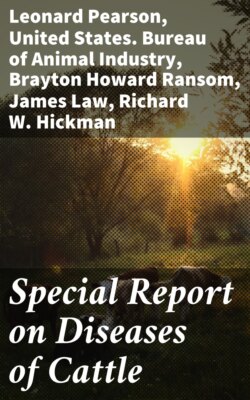Читать книгу Special Report on Diseases of Cattle - Lowe - Страница 35
На сайте Литреса книга снята с продажи.
INDIGESTION (DYSPEPSIA, OR GASTROINTESTINAL CATARRH).
ОглавлениеTympanites, already described, is a form of indigestion in which the chief symptom and most threatening condition is the collection of gas in the paunch. This symptom does not always accompany indigestion, so it is well here to consider other forms under a separate head. If indigestion is long continued, the irritant abnormal products developed cause catarrh of the stomach and intestines—gastrointestinal catarrh. On the other hand, however, irritant substances ingested may cause gastrointestinal catarrh, which, in turn, will cause indigestion; hence, it results that these several conditions are usually found existing together.
Causes.—Irritant feed, damaged feed, overloading of the stomach, or sudden changes of diet may cause this disease. Want of exercise predisposes to it, or feed which is coarse and indigestible may after a time produce it. Feed which possesses astringent properties and tends to check secretion may also act as an exciting cause. Feed in excessive quantity may lead to disorder of digestion and to this disease. It is very likely to appear toward the end of protracted seasons of drought; therefore a deficiency of water must be regarded as one of the conditions which favor its development.
Symptoms.—Diminished appetite, rumination irregular, tongue coated, mouth slimy, dung passed apparently not well digested and smelling bad, dullness, and fullness of the flanks. The disease may in some cases assume a chronic character, and in addition to the foregoing symptoms slight bloating or tympanites of the left flank may be observed; the animal breathes with effort and each respiration may be accompanied with a grunt, the ears and horns are alternately hot and cold, rumination ceases, the usual rumbling sound in the stomach is not audible, the passage of dung is almost entirely suspended, and the animal passes only a little mucus occasionally. Sometimes there is alternating constipation and diarrhea. There is low fever in many cases.
The disease continues a few days or a week in the mild cases, while the severe cases may last several weeks. In the latter form the emaciation and loss of strength may be very great. There is no appetite, no rumination, nor peristalsis. The mouth is hot and sticky, the eyes have receded in their sockets, and milk secretion has ceased. In such cases the outlook for recovery is unfavorable. The patient falls away in flesh and becomes weaker, as is shown by the fact that one frequently finds it lying down.
On examining animals which have died of this disease it is found that the lining membrane of the fourth stomach and the intestines, particularly the small intestine, is red, swollen, streaked with deeper red or bluish lines, or spotted. The lining of the first three stomachs is more or less softened, and may easily be peeled off. The third stomach (psalter) contains dry feed in hard masses closely adherent to its walls.
In some cases the brain appears to become disordered, probably from the pain and weakness and from the absorption of toxins generated in the digestive canal. In such cases there is weakness and an unsteady gait, the animal does not appear to take notice of and will consequently run against obstacles; after a time it falls and gives up to violent and disordered movements. This delirious condition is succeeded by coma or stupor, and death ensues.
Treatment.—Small quantities of roots, sweet silage, or selected grass or hay should be offered several times daily. Very little feed should be allowed. Aromatic and demulcent drafts may be given to produce a soothing effect on the mucous lining of the stomachs and to promote digestion. Two ounces of camomile flowers should be boiled for 20 minutes in a quart of water and the infusion on cooling should be given to the affected animal. This may be repeated three or four times a day. When constipation is present the following purgative may be administered: One pound of Glauber's salt dissolved in a quart of linseed tea and a pint of molasses. After this purgative has acted, if there is a lack of appetite and the animal does not ruminate regularly, the powder mentioned in remarks on the treatment of chronic tympanites may be given according to directions. The diet must be rather laxative and of an easily digestible character after an attack of this form of indigestion. Feed should be given in moderate quantities, as excess by overtaxing the digestive functions may bring on a relapse. Ice-cold water should be avoided.
